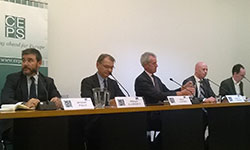BusinessEurope Headlines No. 2015-30
Beyrer to EU ministers: improve competitiveness across the board
 “In a changing world, with many emerging economies stalling, we urgently need to do our homework and make the European economy more competitive”, BusinessEurope Director General Markus J. Beyrer stressed in a letter to Deputy Prime Minister of Luxembourg Etienne Schneider, ahead of the Competitiveness Council meeting on 1 October. Competitiveness must be systematically mainstreamed and assessed in all policy areas, including data protection or energy and climate policy. BusinessEurope firmly endorses the EU Emissions Trading Scheme as the cornerstone of climate and energy policy, but we need to keep strong protection measures for industrial sectors exposed to international competition, until our main competitors have comparable carbon costs. A key tool to ensure competitiveness mainstreaming is also the better regulation agenda. Cutting red tape and devising proportionate legislation should be a mind-set of all policy and decision-makers.
“In a changing world, with many emerging economies stalling, we urgently need to do our homework and make the European economy more competitive”, BusinessEurope Director General Markus J. Beyrer stressed in a letter to Deputy Prime Minister of Luxembourg Etienne Schneider, ahead of the Competitiveness Council meeting on 1 October. Competitiveness must be systematically mainstreamed and assessed in all policy areas, including data protection or energy and climate policy. BusinessEurope firmly endorses the EU Emissions Trading Scheme as the cornerstone of climate and energy policy, but we need to keep strong protection measures for industrial sectors exposed to international competition, until our main competitors have comparable carbon costs. A key tool to ensure competitiveness mainstreaming is also the better regulation agenda. Cutting red tape and devising proportionate legislation should be a mind-set of all policy and decision-makers.
Read more or contact: Cecilia Zappala
Building a true single market for Europe
 Making our single market work better is key to make Europe more competitive. Barriers to free movement represent an untapped economic potential of 5% of EU GDP. These obstacles hamper growth and job creation and harm European companies’ competitiveness. On 28 September BusinessEurope published ‘Building a true single market for Europe - Business priorities’, a strategy paper outlining our expectations from the upcoming internal market strategy for Europe, to present concrete proposals for improvement with a systematic focus on better application of existing rules in practice.
Making our single market work better is key to make Europe more competitive. Barriers to free movement represent an untapped economic potential of 5% of EU GDP. These obstacles hamper growth and job creation and harm European companies’ competitiveness. On 28 September BusinessEurope published ‘Building a true single market for Europe - Business priorities’, a strategy paper outlining our expectations from the upcoming internal market strategy for Europe, to present concrete proposals for improvement with a systematic focus on better application of existing rules in practice.
Read more or contact: Guido Lobrano
How to include SMEs in the single market strategy efficiently
 Facilitating the cross-border provision of services through enhanced points of single contact (PSCs) must be of high priority, BusinessEurope’s Director of Entrepreneurship and SMEs Daniel Cloquet said at the EP SME Intergroup meeting on 23 September devoted to the upcoming single market strategy. PSCs should function not only as databanks providing information on national rules, but also as support tools offering companies all the assistance they need to operate across borders. Today, the vast majority of PSCs are only providing a very basic assistance to SMEs interested in trading or investing on a foreign market. Most PSCs comply only with the rather elementary requirements laid down by the services directive in terms of assistance provision, and not with those included in the PSC quality charter published in 2013, which is currently open only to voluntary adoption by member states. A European Commission initiative is needed to progress that issue.
Facilitating the cross-border provision of services through enhanced points of single contact (PSCs) must be of high priority, BusinessEurope’s Director of Entrepreneurship and SMEs Daniel Cloquet said at the EP SME Intergroup meeting on 23 September devoted to the upcoming single market strategy. PSCs should function not only as databanks providing information on national rules, but also as support tools offering companies all the assistance they need to operate across borders. Today, the vast majority of PSCs are only providing a very basic assistance to SMEs interested in trading or investing on a foreign market. Most PSCs comply only with the rather elementary requirements laid down by the services directive in terms of assistance provision, and not with those included in the PSC quality charter published in 2013, which is currently open only to voluntary adoption by member states. A European Commission initiative is needed to progress that issue.
Contact: Daniel Cloquet
Embracing technology is essential to make the most of the digital revolution
 “In the digital revolution, the losers will be those who are unable to embrace digital technology and adapt to inevitable change”, Cecilia Zappala, Adviser on digital economy, emphasised at the event “Adopting cloud computing within European entrepreneurship” organised by the European Young Entrepreneurs on 28 September. One of the main challenges for European digital entrepreneurs is the fragmentation still existing in the EU digital single market, for instance on data protection and consumer legislation. But challenges are also related to access to finance and giving a second chance for failed entrepreneurs. Jobs will also profoundly change in the digital era. Our education systems need to be adapted to the new skills needed on the market.
“In the digital revolution, the losers will be those who are unable to embrace digital technology and adapt to inevitable change”, Cecilia Zappala, Adviser on digital economy, emphasised at the event “Adopting cloud computing within European entrepreneurship” organised by the European Young Entrepreneurs on 28 September. One of the main challenges for European digital entrepreneurs is the fragmentation still existing in the EU digital single market, for instance on data protection and consumer legislation. But challenges are also related to access to finance and giving a second chance for failed entrepreneurs. Jobs will also profoundly change in the digital era. Our education systems need to be adapted to the new skills needed on the market.
Contact: Cecilia Zappala
Uphold exemptions for non-financial companies to hedge risks
 Do not change the European markets infrastructure regulation (EMIR) to set the clearing thresholds irrespective of the hedging or non-hedging nature of the underlying derivative transactions, BusinessEurope Director General, Markus J. Beyrer wrote to Financial Stability, Financial Services and Capital Markets Union Commissioner Lord Hill. It is crucial that the existing exemptions for non-financial companies are upheld. End-users should not be discouraged from entering into derivative transactions to mitigate underlying real economic risks from their operative businesses. Reduced hedging due to a sharp increase in costs would increase not only the risk for the single corporation concerned but also for the economy as a whole. It will also lead to a different risk assessment of the non-financial companies themselves by capital markets which will negatively affect the cost of equity and financing.
Do not change the European markets infrastructure regulation (EMIR) to set the clearing thresholds irrespective of the hedging or non-hedging nature of the underlying derivative transactions, BusinessEurope Director General, Markus J. Beyrer wrote to Financial Stability, Financial Services and Capital Markets Union Commissioner Lord Hill. It is crucial that the existing exemptions for non-financial companies are upheld. End-users should not be discouraged from entering into derivative transactions to mitigate underlying real economic risks from their operative businesses. Reduced hedging due to a sharp increase in costs would increase not only the risk for the single corporation concerned but also for the economy as a whole. It will also lead to a different risk assessment of the non-financial companies themselves by capital markets which will negatively affect the cost of equity and financing.
Read more or contact: Erik Berggren
Innovation-friendly policies based on accurate scientific evidence under EU focus
 This and other key messages on new scientific evidence mechanisms, the innovation principle or industrial participation in Horizon 2020 were discussed at the last meeting of BusinessEurope Research & Technological Innovation Working Group on 17 September, with a guest speaker from the cCbinet of Commissioner Moedas. Before a mutually enriching exchange with BusinessEurope members, representatives of companies and European sectoral associations, Keith Sequeira outlined the key activities and priorities of the Research, Science and Innovation Commissioner and made a plea to members for delivering their inputs on a number of topics, including the European Innovation Council, simplification of Horizon 2020 for the mid-term review or synergies of EU funding. BusinessEurope also welcomed Moedas’ confirmation that he should actively participate in the planned high-level innovation conference in January 2016.
This and other key messages on new scientific evidence mechanisms, the innovation principle or industrial participation in Horizon 2020 were discussed at the last meeting of BusinessEurope Research & Technological Innovation Working Group on 17 September, with a guest speaker from the cCbinet of Commissioner Moedas. Before a mutually enriching exchange with BusinessEurope members, representatives of companies and European sectoral associations, Keith Sequeira outlined the key activities and priorities of the Research, Science and Innovation Commissioner and made a plea to members for delivering their inputs on a number of topics, including the European Innovation Council, simplification of Horizon 2020 for the mid-term review or synergies of EU funding. BusinessEurope also welcomed Moedas’ confirmation that he should actively participate in the planned high-level innovation conference in January 2016.
Contact: Jan Bambas
Setting out business views on corporate tax transparency
 Businesses support the European Commission’s fight against tax fraud and evasion, Jeroen Lammers from BusinessEurope’s Tax Policy Group stressed at an event organised by the Centre for European Policy Studies on 24 September. Drawing on his experience as VNO’s Tax Policy Manager, he noted in particular that tax fraud can create competitive distortions at the expense of the vast majority of businesses who pay nearly 2 trillion euros of taxes in the EU annually. However, while the business community has engaged constructively with the OECD plans for increased country-by-country reporting of companies’ tax information, he also warned that additional and unilateral adoption of measures by the EU regarding tax disclosure could have negative consequences for EU growth and employment. In particular, long-term investment decisions involve assessing risk and reliability or stability of markets, returns and regulatory environments. Adding transparency requirements that exceed those in the OECD countries can be seen as evidence of a more risky investment environment.
Businesses support the European Commission’s fight against tax fraud and evasion, Jeroen Lammers from BusinessEurope’s Tax Policy Group stressed at an event organised by the Centre for European Policy Studies on 24 September. Drawing on his experience as VNO’s Tax Policy Manager, he noted in particular that tax fraud can create competitive distortions at the expense of the vast majority of businesses who pay nearly 2 trillion euros of taxes in the EU annually. However, while the business community has engaged constructively with the OECD plans for increased country-by-country reporting of companies’ tax information, he also warned that additional and unilateral adoption of measures by the EU regarding tax disclosure could have negative consequences for EU growth and employment. In particular, long-term investment decisions involve assessing risk and reliability or stability of markets, returns and regulatory environments. Adding transparency requirements that exceed those in the OECD countries can be seen as evidence of a more risky investment environment.
Contact: Mafalda Moz Teixeira
Trade and investment priorities in the Netherlands
 The trade and investment agenda of the upcoming Dutch presidency of the European Council was discussed on 25 September, when BusinessEurope International Relations department visited The Hague to meet officials of the Dutch Foreign Office. During the meetings, BusinessEurope was briefed on the priorities of the Dutch presidency, and discussed the priorities of European business in a range of trade and investment topics. There were also exchanges of views with ministry officials on the issues that will likely come up on the European agenda during the first half of 2016. The department also met the Social and Economic Council and the international department of VNO-NCW, the Dutch member federation of BusinessEurope.
The trade and investment agenda of the upcoming Dutch presidency of the European Council was discussed on 25 September, when BusinessEurope International Relations department visited The Hague to meet officials of the Dutch Foreign Office. During the meetings, BusinessEurope was briefed on the priorities of the Dutch presidency, and discussed the priorities of European business in a range of trade and investment topics. There were also exchanges of views with ministry officials on the issues that will likely come up on the European agenda during the first half of 2016. The department also met the Social and Economic Council and the international department of VNO-NCW, the Dutch member federation of BusinessEurope.
Contact: Maurice Fermont
On the road to Paris: recent perspectives on INDCs – Register now!
 Looking into experiences gained from the intended nationally determined contributions (INDCs) submitted so far, and triggering the debate on first lessons from their analysis both in terms of ambition and comparability, will be themes for the seminar BusinessEurope organises on 8 October 2015. The INDCs process is a unique, worldwide, bottom-up process, which is key for a successful outcome of the international climate summit in Paris in December 2015. It is expected to bring meaningful indications about post-2020 climate policies and instruments. INDCs are of great importance for industry and businesses which expect clarity and predictability on policies, as early as possible in order to plan their investment decisions.
Looking into experiences gained from the intended nationally determined contributions (INDCs) submitted so far, and triggering the debate on first lessons from their analysis both in terms of ambition and comparability, will be themes for the seminar BusinessEurope organises on 8 October 2015. The INDCs process is a unique, worldwide, bottom-up process, which is key for a successful outcome of the international climate summit in Paris in December 2015. It is expected to bring meaningful indications about post-2020 climate policies and instruments. INDCs are of great importance for industry and businesses which expect clarity and predictability on policies, as early as possible in order to plan their investment decisions.
Read more, register or contact: Xandra Hjort
Calendar
 4 October 2015: elections in Portugal
4 October 2015: elections in Portugal- 5-6 October 2015: meeting of the Eurogroup and Economic and Financial Affairs Council
- 5 October 2015: “Education and the investment plan for Europe” conference
- 5-8 October 2015: European Parliament plenary sitting, Strasbourg - incl. debate with François Hollande and Angela Merkel
Contact: BusinessEurope Headlines